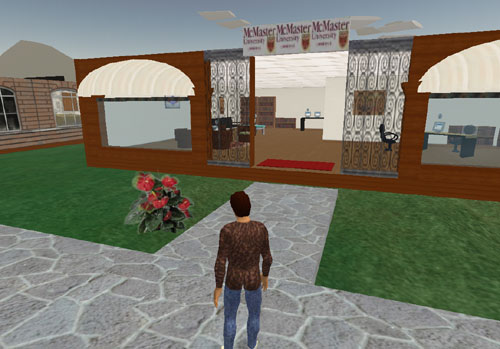After being exhausted from trying to handle two days at my first OLA Super Conference (1, 2) I decided that one day was enough this year.
So I braved the Toronto snow storm on Friday and made my way down to the Metro Convention Centre.
Session 1009 – Google: The New Library Vendor
This session was given by Greg Sennema from Wilfred Laurier. The OCULA blog gives a good description of the talk. I saw his session about WordPress last year and again he put together a very solid presentation. Having a keen interest in all things Google, I must admit I already knew about some of the topics he touched on such as iGoogle and Custom Search Engines. However, his main point in showing some of the new tools Google is creating was to ask the question about how they will effect the services libraries provide in the short and long-term. A thought provoking idea he mentioned was whether projects like Google Books (scanning all of the books in libraries like the University of Michigan, etc.) will replace the traditional delivery of ILL. While the full-text of copyrighted books are not being provided to the public through Google Books, you can imagine that in the future that various universities that are part of the Google Books project may come together to provide full-text access to each others’ user communities, thereby making all the staff time and cost of traditional ILL irrelevant. I’m sure the copyright-owner lobbyists may have an objection or two to this however.
Session 1100 – Slow in the age of speed
This presentation by Carl Honore, author of “In Praise Of Slow“, inspired me to try and make more time to nap in my office. I’ll report back on how my supervisor feels about this effort to be more productive.
Session 1204 – The Kids Are Alright, Or are They?
Any session named after a Who song has to be good. The content of this very interesting talk is summarized well on the OCULA blog. I’m already an avowed Mohawk Library fanboy so it was interesting see and hear from two of the schools’ main librarians. I think the lovely (and award winning) Jennifer commented on my post back in the day. They talked about how educators, library people, etc. are inundated with the idea that today’s students (millenials, etc.) have all these specific characteristics (naturally tech-savy, able to do their homework while listening to their iPods, have differently wired brains, spend all their time in Second Life, etc.) so we must change the ways we instruct and interact with them. They talked about how these claims did not always square with their experiences at the reference desk. I know how they feel. Seeing students struggle with Microsoft Office documents that open inside WebCT and not knowing how to print them, I question the theory that because a kid plays World Of Warcraft all day that he somehow becomes a savant at how various software systems interact.
The speakers did a great job at peaking behind some of the research the Mark Prensky’s of the world use to back up their claims and showing the lack of solid scholarship at the heart of much of it. I knew I recognized that name when they mentioned it and I remembered that I did a copyright request for the use of some of his materials. Hopefully the department I did the request for isn’t basing all their plans on Prensky’s work.
All in all, an excellent example of evidenced based librarianship. Check out the blog they created for their research: http://kidsarealright.wordpress.com/
Session 1318 – Scholar’s Portage. Avoiding the Waterfall: Leveraging Social Networking Tools And Scholars Portal Data
Come 3:45pm on a snowy day, the third day of the conference, people are naturally getting a little tired. Add to this a session that some people may consider a little on the ‘dry’ side and it added up to a sparsely attended event. Luckily I dig ‘dry’ and throw in a cute librarian who’s really into music giving the presentation so I found the session very worthwhile. While it has very little effect on my duties I am always curious about what exactly Scholars Portal is and what the future plans are for this joint effort of Ontario’s universities. The speakers gave some interesting insights into what they do now and were open about their thinking process in trying to decide how to evolve their services in a way that truly is a benefit to their users and not just Library 2.0 applications for the sake of Library 2.0. As usual I’m doing a lousy job of describing the session so here is:
Conclusion
All in all it was another very well organized event with interesting speakers and topics. My only complaint was the lack of a free pen in my conference package. Also I can’t really be seen carrying around a bag covered in butterflies so I had to give the conference bag away to my Mom. I also forgot to see if Access Copyright was giving away free mints again this year. There’s always next year.


